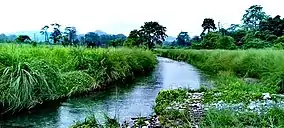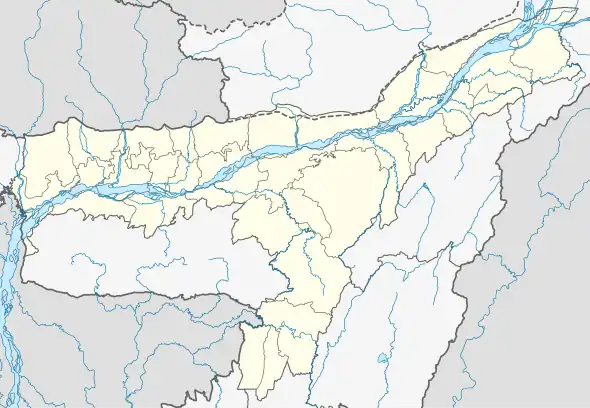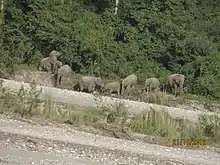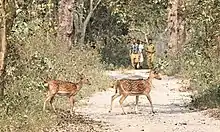Raimona National Park
Raimona National Park is located in extreme western part of Assam, India. It is spread across Gossaigaon and Kokrajhar subdivisions of Kokrajhar district of BTR.[1]
| Raimona National Park | |
|---|---|
 Western parts of Raimona National Park | |
  | |
| Location | Saralpara, Kokrajhar district, Assam |
| Nearest city | Kokrajhar |
| Coordinates | 26.65972°N 89.97611°E |
| Area | 422 km2 (163 sq mi) |
| Created | 9 June 2021 |
| Governing body | Government of Assam |
History
It was declared a National Park on 5 June 2021 by the announcement of Assam's Chief Minister Himanta Biswa Sarma on the occasion of World Environment Day at Gandhi Mandap, Guwahati. On 9 June 2021; it became as National Park through an Assam Gazette Notification no.FRW.02/2021/27 dtd. 8 June 2021. It is a part of a contiguous forest patch with an area of 422 km2 (163 sq mi) covering the northern part of the notified Ripu Reserve Forest (508.62 km2 (196.38 sq mi)), which forms the westernmost buffer to Manas Tiger Reserve in the foothills of Eastern Himalaya Biodiversity Hotspot.[2] The present Raimona National Park was originally recommended as Ripu-Chirang Wildlife Sanctuary being part of Ripu reserved forest and Chirang reserved forest being adjacent a part of it was also mooted to be within. Those were made owing to its significance for conservation of Asian elephants, gaur or Indian "bison" and golden langur, all of which have large populations in the area.[3][4][5] It is also part of Chirang-Ripu Elephant Reserve.
Description
The boundary of Raimona National Park is marked by the Sankosh River on the west, along the inter-state boundary of West Bengal and Assam from Indo-Bhutan border up to fire line Ride-6 southwards (BP30) and Saralbhanga River on the east, runs northwards till it touches the Indo-Bhutan international boundary on the north and remaining part of Ripu Reserve Forest on the south. The southern boundary runs eastwards along the fire line Ride-6 up to Pekua River where it runs at 90 degrees southwards till it meets the fire line Ride-3.[6]
The area is located along the Himalayan foothills and together with Phibsoo Wildlife Sanctuary of Bhutan and Buxa Tiger Reserve of West Bengal forms a fairly large trans-boundary conservation landscape of more than 2,400 km2 (930 sq mi).[7]
Biodiversity


Raimona National Park is famous for golden langur, an endemic species (with Bhutan) which has been named as the mascot of Bodoland region. It also has Asian elephant, Bengal tiger, clouded leopard, gaur, chital, four to five species of hornbills, more than 150 species of butterflies, 190 species of birds,[8] 380 varieties of plants and orchids.[9] It is already on the global map for being an important bird and biodiversity area.[10]
Wildlife
Fauna
Being a moist deciduous and semi-evergreen forest, this National Park is rich in biodiversity. It has four non-human primates, slow loris, Assamese macaque, Rhesus monkey and capped langur.[11] Other noteworthy mammals found in this national park includes Chinese pangolin, dhole or Asian wild dog, Himalayan black bear, crab-eating mongoose, jungle cat, leopard cat, Asian golden cat, Bengal tiger, leopard, clouded leopard, Asian elephant, gaur, Himalayan serow, sambar, chital, hog deer, barking deer, crestless Himalayan porcupine and hispid hare.[12]
Avifauna
Raimona forest harbours more than 260 bird species and confirmed presence of minimum 227 avian species that includes 7 globally threatened avian fauna out of which two species were critically endangered such as White-rumped vulture and Slender-billed vulture ; five vulnerable viz., Greater spotted eagle, Great hornbill, Wreathed hornbill, Rufous-necked hornbill , Lesser adjutant as well as seven near threatened species. Amongst these, there were a total 43 migratory bird species and 184 were residential bird species as per Choudhury (2000). These includes a total 45 species of aquatic birds and 182 species of terrestrial birds as observed in the field and described by Grimmett et al. (2016). Among all the recorded avian fauna, Black-crested bulbul, Black drongo and Golden- fronted leafbird were respectively three highly dominant species found in all the habitat types of Raimona National Park. Passeriformes holds around 116 species (51%) making it the dominant in terms of species richness.[13] Avifauna includes critically endangered white-bellied heron, swamp francolin, kaleej pheasant, grey peacock pheasant, Indian peafowl, Oriental darter, lesser adjutant, collared falconet, slender-billed vulture, white-backed vulture, besra, black baza, Jerdon's baza, osprey, Bengal florican, now perhaps extirpated, ibisbill, green imperial pigeon, mountain imperial pigeon, red-breasted parakeet, great pied hornbill, occasional rufous-necked and grey hornbills, wreathed hornbill, hill myna and scaly thrush.[14]
References
- "Raimona becomes Assam's sixth national park". thenewsmill.com. The News Mill. 5 June 2021. Retrieved 5 June 2021.
- "Assam: Raimona declared National Park on World Environment Day". assamtribune.com. The Assam Tribune. 5 June 2021. Retrieved 5 June 2021.
- Choudhury, A.U. (1999). Status and Conservation of the Asian elephant Elephas maximus in north-eastern India. Mammal Review 29(3): 141–173.
- Choudhury, A.U. (2002). Distribution and Conservation of the gaur Bos gaurus in the Indian Sub-continent. Mammal Review 32(3): 199–226.
- Choudhury, A.U. (2002). Golden langur Trachypithecus geei threatened by habitat fragmentation. Zoo's Print Journal 17(2): 699–703.
- "Raimona becomes Assam's sixth national park". raimonagoldenlangur.org. The Hindu. 5 June 2021. Retrieved 5 June 2021.
- "Raimona Assam's new national park with rich flora and fauna". raimonagoldenlangur.org. Northeast India24. 5 June 2021. Retrieved 5 June 2021.
- "https://www.guwahatiplus.com/assam/190-different-species-of-butterflies-recorded-in-assams-raimona-national-park". www.guwahatiplus.com/. 31 October 2022.
{{cite web}}: External link in|title= - "Assam gets its sixth national park, golden langur habitat Raimona". raimonagoldenlangur.org. Deccan Herald. 5 June 2021. Retrieved 5 June 2021.
- Rahmani, A.R. et al. (2016). Important Bird & Biodiversity Areas in India. Vol. 1. Bombay Natural History Society and Bird Life International.
- Choudhury, A. U. (1989). Primates of Assam: their distribution, habitat and status. Guwahati: Gauhati University.
- Choudhury, A. U. (2013). The mammals of North East India. Guwahati: Gibbon Books and the Rhino Foundation for Nature in NE India. ISBN 978-9380652023.
- "Raimona National Park » Naparks". 5 August 2023. Retrieved 2 September 2023.
- Choudhury, A. U. (2000). The birds of Assam. Guwahati: Gibbon Books and the WWF-India NE Region Office. ISBN 8190086618.
